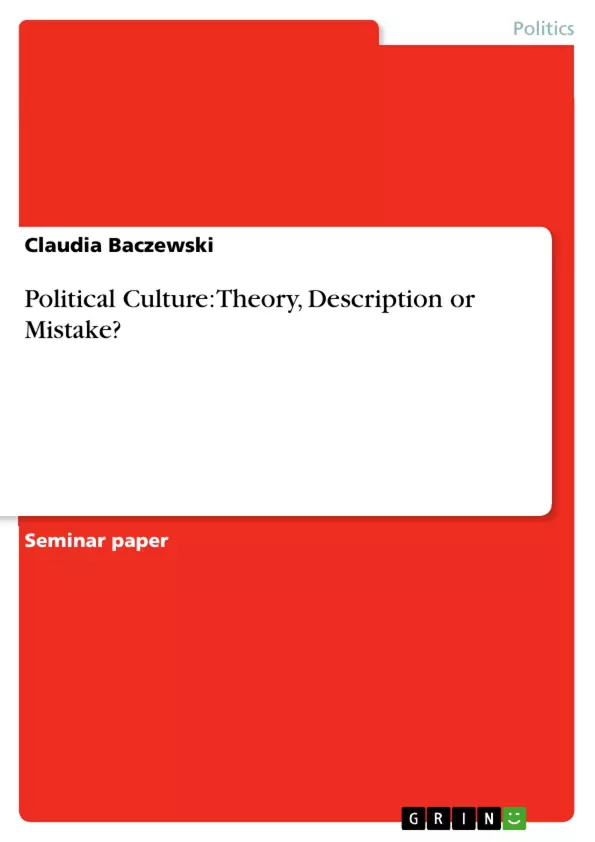There are three theoretical schools within the field of comparative politics: the rational choice theories, the culturalist approaches as well as the structural analyses. This paper addresses the culturalist approach within comparative politics. To begin with the paper offers different definitions of ‘culture’, then shows how change in political culture can be measured and presents two different techniques for measuring values. The theory of political culture has many inquiries: among others it tries to explain electoral turnout, change in political behavior, and economic growth.
Inhaltsverzeichnis (Table of Contents)
- Introduction
- What is 'Culture', can it change, and how to measure it.
- Ranking vs. Rating
- Conclusion
Zielsetzung und Themenschwerpunkte (Objectives and Key Themes)
This paper examines the culturalist approach within comparative politics, exploring the concept of political culture and its influence on political behavior. It aims to define political culture, discuss its potential for change, and present different techniques for measuring cultural values.
- Defining political culture and its role in shaping political behavior
- Analyzing how political culture can change over time
- Comparing different techniques for measuring cultural values
- Exploring the impact of political culture on political institutions and processes
- Investigating the relationship between political culture and rational choice theory
Zusammenfassung der Kapitel (Chapter Summaries)
The introduction of the paper establishes the culturalist approach as one of the three main theoretical schools within comparative politics. It also outlines the paper's focus on defining political culture, discussing its potential for change, and presenting different techniques for measuring cultural values.
Chapter 2 delves into the concept of "culture" itself, examining its various definitions and its influence on political identity and behavior. The chapter explores the challenges of measuring cultural change, citing Putnam's work on "Making Democracy Work" as a potential solution. It also discusses Inglehart's view of political culture as an enduring and impactful force that influences the viability of democratic institutions.
Chapter 3 focuses on the comparison of two techniques for measuring values: ranking and rating. It highlights the advantages and disadvantages of each technique, advocating for ranking as a more effective approach for measuring priorities and avoiding response set biases.
Schlüsselwörter (Keywords)
The main keywords and focus topics of this paper include political culture, culturalist approach, comparative politics, values, norms, beliefs, political behavior, change, measurement, ranking, rating, institutional performance, and democratic institutions.
Frequently Asked Questions
What is the culturalist approach in comparative politics?
It is a theoretical school that explains political behavior, economic growth, and institutional performance through the lens of cultural values, norms, and beliefs.
Can political culture change over time?
Yes, the paper discusses how political culture evolves and presents methods to measure these changes, referencing works like Putnam's "Making Democracy Work."
What is the difference between ranking and rating values?
Ranking requires participants to prioritize values against each other, while rating allows them to score each value independently. Ranking is often seen as more effective for measuring true priorities.
How does political culture influence democratic institutions?
According to researchers like Inglehart, an enduring political culture is a force that significantly impacts the viability and stability of democratic systems.
What does the theory try to explain?
It addresses inquiries such as electoral turnout, changes in political behavior, and why some countries experience faster economic growth than others.
- Citar trabajo
- Claudia Baczewski (Autor), 2005, Political Culture: Theory, Description or Mistake?, Múnich, GRIN Verlag, https://www.grin.com/document/63376



